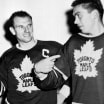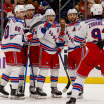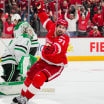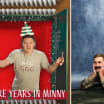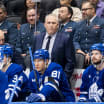NHL launches NHL Street to bring ball hockey to kids across North America
Program aimed at breaking down barriers of accessibility, affordability
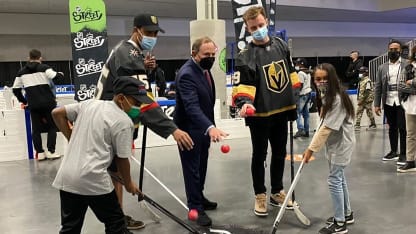
The NHL is launching NHL Street, a program designed to build a new era in street hockey that is fun, relevant, and aimed at getting more kids involved in playing the game.
"We want to create good memories," NHL director of social impact, growth and fan development Andrew Ference said. "We don't need to create a whole batch of the next NHLers. That might happen organically on its own, but we just want [to] create really fun times and memories with hockey."
The NHL was involved in street hockey programs in the 1990s and, with the rebirth, has rebranded it with a new look using neon colors and cleaner designs.
"When we started breaking down what the barriers are to our game, whether it's access to an ice rink or family history with the game or it not being culturally relevant to people, you can go on and on, [also] price point, you land at street hockey because it's the easiest way to play our game," Ference said, regarding the sport played in sneakers instead of skates. "You need a stick, a ball, something to shoot on and then a bunch of buddies. But the game of street hockey has always kind of been an afterthought."
Ference played 907 games in 16 NHL seasons from 1999-2016, but understands not everyone who learns how to play the sport has a goal of playing at the highest level like he did. When the NHL Street pilot program launched during the 2022 Honda NHL All-Star Weekend in Las Vegas from Feb. 3-6, the goal was to create a unique hockey experience for kids that was fun.
About 1,000 local children primarily ages 8-12 from schools and hockey programs got to take part with Vegas Golden Knights forwards Jack Eichel and Keegan Kolesar, and retired defenseman Deryk Engelland, who stopped by throughout the weekend.
The idea is to expand the program to ages 5-17 all across North America, with a heavy focus on non-traditional NHL markets.
"A lot of the kids who are here this weekend have never played hockey," Ference said. "In the whole state of Nevada, I think there's 2,000 registered ice hockey players. A lot of these kids have never picked up a stick, they've never skated. This form of the game is so accessible and it's a blast."
Though 2,000 may seem like a small number, that's up from 30 kids prior to the Golden Knights entering the NHL for the 2017-2018 season.
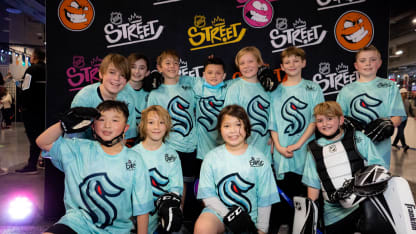
The pilot program will also be showcased at several other events and cities, including the 2022 Navy Federal Credit Union Stadium Series in Nashville between the Nashville Predators and Tampa Bay Lightning on Saturday (7:30 p.m. ET; TNT, SN360, TVAS2, NHL LIVE). Five hundred kids are expected to participate, including many who will be playing hockey for the first time and live in communities without access to arenas or ball hockey facilities.
NHL Street will also be showcased at the NHL Draft in Montreal on July 7-8, and is expected to launch league play this summer.
To help build the program and get it off the ground, the NHL partnered with RCX Sports, a company that also works with the NBA and MLB.
"We spent a year, a year plus collaborating with the NHL to figure out what's the best way to give them an opportunity, or even greater footprint, to make a stronger presence in the sport of hockey for youth," former NFL player and president of RCX Sports Izell Reese said. "What came about was NHL Street. It's very similar to the NFL Flag model; league play at its purest level.
"It takes the kids off the ice but puts more balls and sticks in the hands and at the end of the day, is still hockey. We think this could be phenomenal for the sport. Place it in urban communities, get more females participating, put it in more rural areas and not just in club markets. I think the sky is the limit of the opportunity here with ball hockey."
RCX Sports will help market the program, organize tournaments and events, and help with uniforms, supplies and equipment.
"The goal is] to create a unique way not only to draw youth sports participation but a better quality that is both affordable and accessible to get more kids playing that particular sports," Reese said. "I think people will be really excited about what they're going to see and what we are going to get ready to launch on behalf of the NHL and NHL Street."
NHL Street aims to engage families with recreational programming that is local, affordable, fun and culturally relevant and will use the pilot program to receive feedback on how to make it an even better experience.
"From a long-term perspective, as much as we want to focus on Canada and the US market, and this year as the pilot so we can fine-tune the model based on feedback, in the long-term the plan is for this to be sustainable," Reese said. "How can we get hundreds of thousands of kids to play this and continue to play this?"
One of the ways the program is looking to do that is to have as many registered youth ball hockey players as ice hockey players in North America, supported by a presence in non-traditional NHL markets.
"We essentially went down the path of finding a good partner to work with to eventually have more kids playing street hockey than ice hockey in hopefully the next five years," Ference said. "We're going to get into the Albuquerque, New Mexicos, the North Dakotas, the Saskatchewans, where no NHL teams are where we don't have a presence, and also into our markets as well."
For more information, visit
[NHL Street's website
.







